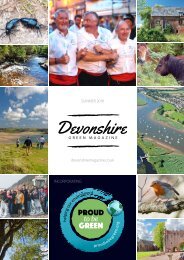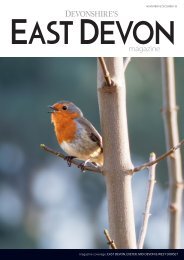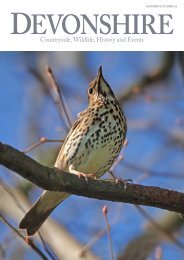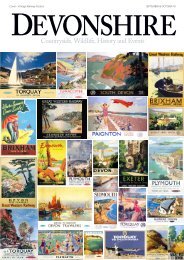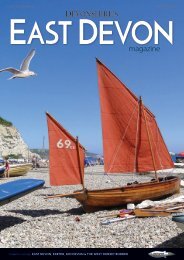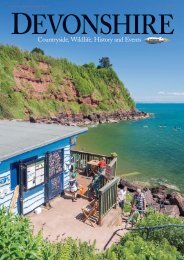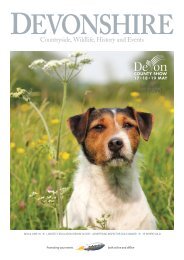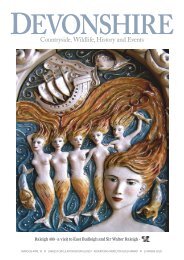Devonshire's East Devon magazine September October 2018
You also want an ePaper? Increase the reach of your titles
YUMPU automatically turns print PDFs into web optimized ePapers that Google loves.
Railway Posters<br />
The marketing message:<br />
I think<br />
the Yanks<br />
may have<br />
called this<br />
marketing<br />
message<br />
highfalutin!<br />
Oops - that's cocked it up a little!<br />
(if you'll pardon the vernacular).<br />
Is not the word 'east' perceived<br />
as being a little chilly? "<strong>East</strong>ern<br />
Block" for instance - we all know<br />
it's cold over there. It's hard to find<br />
any evidence of when <strong>East</strong> <strong>Devon</strong><br />
first came into being, although<br />
<strong>East</strong> <strong>Devon</strong> District Council was<br />
formed in 1974, but the '<strong>East</strong><br />
<strong>Devon</strong>' name may have had earlier<br />
origins. Many posters show Seaton,<br />
Sidmouth, Exmouth as being<br />
in South <strong>Devon</strong>, I suspect South<br />
<strong>Devon</strong> was an abbreviated 'South<br />
Coast of <strong>Devon</strong>' (see poster below).<br />
Yes, your eyes don't deceive you,<br />
Seaton, Sidmouth and Exmouth<br />
are in South <strong>Devon</strong> - not an '<strong>East</strong><br />
<strong>Devon</strong>' in sight.<br />
Cor blimey, looks posh! the 'Riviera'<br />
term hinting at the rather chic French<br />
Riviera, playground to the rich, why not<br />
the same in Torquay.<br />
We very much take for<br />
granted our annual holiday<br />
allowance these days, it's easy to<br />
forget that statutory paid leave<br />
entitlement for the working<br />
classes didn't exist before 1938.<br />
The Industrial Revolution relied<br />
on heavy mechanisation and<br />
masses of workers deployed in<br />
factories. Before the Industrial<br />
Revolution, much of the work<br />
across our country was on the<br />
land. Land workers did enjoy<br />
seasonal breaks that were<br />
a natural cause of weather<br />
conditions at different times of<br />
the year, but nothing was set<br />
in stone.<br />
In the years before the Holidays<br />
with Pay Act there was of course<br />
Wakes Week, particularly<br />
relating to the mill towns of<br />
Lancashire. Images of people<br />
crowding into a charabanc<br />
are fairly commonplace. The<br />
Artistry in Marketing<br />
In the early years of our seaside tourist industry, train travel<br />
was in its golden age and the selling of train destinations<br />
to the public was an extremely important business<br />
charabanc was akin to a flat deck<br />
lorry with wooden bench seats<br />
affixed, fairly primitive and often<br />
open to the elements.<br />
Trade unions in the 1930s<br />
lobbied the government and in<br />
1936 the International Labour<br />
Organisation adopted a two week<br />
paid annual holiday, although in<br />
the United Kingdom this failed<br />
to be ratified.<br />
In 1936 the French (who else!),<br />
called a general strike and the<br />
French Government relented,<br />
agreeing to bring in two weeks<br />
of paid leave.<br />
Teignmouth<br />
IS <strong>Devon</strong>,<br />
well the<br />
poster<br />
certainly<br />
paints<br />
a pretty<br />
picture.<br />
In the UK however, common<br />
sense prevailed and the<br />
Holidays with Pay Act 1938<br />
was introduced, unfortunately<br />
the entitlement was for just one<br />
week of paid leave and it did not<br />
cover all workers, only applying<br />
to workers where their minimum<br />
wage rates had been set by trade<br />
boards. You also have to bear<br />
in mind that World War II was<br />
looming in 1939.<br />
The Holidays with Pay Act<br />
certainly heralded a boom in<br />
the seaside tourism industry,<br />
but this didn't really come in to<br />
play until well after the end of<br />
the war, not forgetting of course<br />
that following the war, rationing<br />
continued until 1954.<br />
The infrastructure was in place<br />
however; lots of workers with cash<br />
to spend looking for maximum<br />
enjoyment; an extensive network<br />
of trains across the country. The<br />
62<br />
A fairly simple,<br />
early GWR poster.<br />
Stylistically Art<br />
Deco?<br />
A departure from the<br />
seaside theme here,<br />
and why not, the Dart<br />
Countryside, History, Walks, the Arts, Events & all things <strong>Devon</strong> is at: truly DEVONSHIRE glorious. <strong>magazine</strong>.co.uk<br />
estuary is beautiful.<br />
There's no denying the obvious<br />
honesty in this marketing message -<br />
An early monochrome poster<br />
(Southern Railway) - underneath<br />
LOVELY DEVON it says<br />
'Twixt Exe & Lyme', so it's<br />
referring to what we now know<br />
as <strong>East</strong> <strong>Devon</strong> (see top left).




